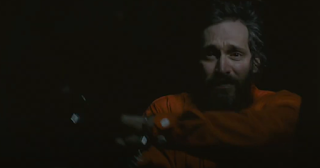Philip Seymour Hoffman did not receive an Oscar nomination for portraying the titular character of Jack Goes Boating.
Jack Goes Boating is Philip Seymour Hoffman's only film he directed about two couples and their growth or lack of growth over time.
Hoffman himself plays Jack, the male half of one of the two potential couples, as he gets set up by his friend couple, Clyde (John Ortiz) and Lucy (Daphne Rubin-Vega), with the off-beat Connie (Amy Ryan). The film is very stagy, and attempts non-staginess, as we either get long conversational scenes ideal for stage, off-set by very obvious attempts to not be stagy which unfortunately are mainly musical montages that don't do all that much other than breakup the scenes. Hoffman is a performer I never mind seeing another film from because it means I get to see that much more of an actor who left us all far too young, and that is the case again here in Jack Goes Boating. I like seeing Hoffman as Jack, mainly because I like Hoffman so much, but I wouldn't say this role or this performance is exactly his biggest challenge, in fact I ponder if he chose this material for his attempt at directing because it didn't ask that much of him in the lead role. As Jack he's kind of a Marty type sad sack, who is a little lost in love and otherwise is just a workaday guy who we frequently see somewhat passively move through his life as limo driver. Hoffman was a great actor though, so even in that passiveness Hoffman does bring a sense of the man building this barrier of attempts protection for himself as he deals with questions that make him feel uncomfortable, such as his relationship status, but also being slightly more open when talking about something comforting like his reason for liking Reggae music with his friend Clyde. Hoffman is convincing, and even likable in his modesty that it certainly is believable at a moment's notice.
The central relationship theoretically is where you think is going to be the big challenge for Jack, but it isn't really that. Hoffman mostly brings this modesty there too in his chemistry with Ryan, who is actually giving a fairly atypical performance from her as a more overt eccentric, and Hoffman often is the facilitator and the giver in these scenes together. Which makes sense as the director, and to Hoffman's credit it is believable in the way he constructs Jack to want to please as he can in a very gentle and humble way. He creates the easy sense of appreciation for the opportunity of the relationship and has a natural chemistry with Ryan by letting her go a bit bigger while he balances that with his smallness most of the time. I write most of the time because the one aspect we do get of Jack that is against the rest of his behavior is when something goes wrong or someone purposefully hassles him. There he will suddenly break out in anger and emotional distress. Something that again, Hoffman plays very well in performing it very much as this release valve of someone who contains too much so when there is something that wounds that state Hoffman reveals that extreme reaction. It doesn't feel like a break in the rest of the man, just a natural aspect of who this guy is and what he has been keeping inside. Otherwise we see Jack prepare to go boating by learning how to swim which Hoffman just plays as a dutiful task in a curious preparation to eventually go boating with Connie as a random dating option the two discussed equally as randomly. All of this doesn't lead to all that much other than one more emotional breakdown as Jack, training with cooking as well, burns a dish and has one more outburst. Again well performed as the man just losing his tight grip, that is though satiated by Connie, which Hoffman delivers as Jack using her calm as a way for Jack to find his bearings again. Hoffman gives a good performance, I liked seeing one more turn from him as always, but a great turn from him this is not.


































